Mood changes in the postpartum period are extremely common, ranging from mild and transient “baby...

Acquire a robust understanding of how to manage men’s health issues commonly seen in primary care.
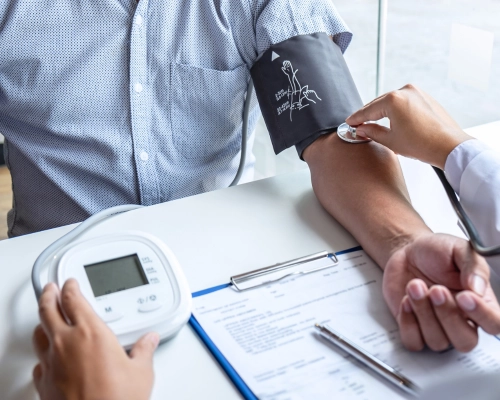
Delivered by leading experts, this program explores medical conditions pertinent to male patients, enabling you to better address men's health concerns in the primary care setting.
- Understand men’s health conditions commonly encountered in primary care.
- This course is perfect for practitioners with no to little prior men's health training.
- This course is for physicians, nurse practitioners, and degree-qualified nurses.
- CPD-accredited and university-reviewed.
You might also be interested in the Advanced Workshop of Non-Scalpel Vasectomy or the Primary Certificate of Sexual Health for Men.
Fulfils 50 hrs for medical professionals in Australia*
100% online
$1595
Special rates available
81.5 hrs
Self-paced
*provided an outcome measurement activity with a minimum of 5 hours is completed.
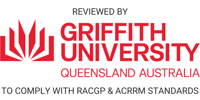
- Confidently provide prostate examinations and manage prostate problems.
- Provide comprehensive mental health care to your male patients.
- Encourage sexual wellness in men and recognise sexually transmitted infections.
- Understand and manage male sexual dysfunction, a widespread health issue.
- Support healthy ageing and wellbeing in men through fitness and exercise advice.
Get unlimited access to all course content, additional learning materials, ongoing post-course support, and more.
This module focuses on prostate conditions and prostate checks. The role of the prostate is outlined and what may happen when it is not functioning normally including symptoms, underlying problems and other common features. It covers benign prostatic enlargement and associated urinary incontinence in men. Conditions that are best referred to a urologist are covered including what treatment options may be considered by the urologist. This is helpful information for the treating medical practitioner to know for continuing patient care. The module includes guides to conducting an initial assessment for various prostate conditions. Unit two content includes planning a prostate check by digital palpation, what to look for and how to interpret the pathology results. Charts, graphs, studies and diagrams assist with determining the appropriate management.
This module focuses on prostate cancer. Topics include symptoms for prostate cancer, diagnosis tools including PSA and digital examination, when to refer and what information to include when referring. Understanding the function and levels of PSA testing is a feature of unit one in addition to outlining prevention studies and men at higher risk. Management of localised prostate cancer including surveillance versus surgery is discussed. Unit two includes information and studies on radiation, neoadjuvant and adjuvant RT therapies, medications, post treatment surveillance and biochemical recurrence after treatment. Unit three discusses metastatic prostate cancer and androgen deprivation therapy, androgen resistance and treatment options. Rare subtypes are covered in addition to bone health and the effects of treatment on the skeleton.
This module focuses on sexually transmitted infections for men commencing with symptoms, screening, diagnosis and management of these infections in men. Infections include herpes simplex (primary and recurrent), human papillomavirus, epidermodysplasia verruciformis, molluscum contagiosum, syphilis, gonorrhoea, chlamydia, chancroid, granuloma inguinale (donovanosis) and HIV. It incorporates the symptoms, diagnosis, treatment and prevention options for STIs. First and second line treatment therapies and complications of some STIs are mentioned. Pathology images of different STIs provide references for the clinical setting. HIV, the connection with AIDS, symptoms and how it affects the body and skin, including investigation options, management and prevention strategies (PrEP) are discussed.
This module focuses on lifestyle choices including smoking and alcohol and the health impacts of these behaviours on health and wellbeing. The module outlines the impact of obesity and the sedentary lifestyle and how these increase the risk of elevated blood lipids, coronary artery disease and peripheral vascular disease. Statistics on insurance claims highlight the health and monetary costs of poorer lifestyle choices. Unit one explores how this behaviour can be prevented and reduce health costs. Statistics on smoking, alcohol and methamphetamine use are presented including the related illnesses that may be caused by these lifestyle choices. Four case studies are profiled including how a medical practitioner can work with patients to encourage positive lifestyle choices. Information and tools on the best approaches to support lifestyle choices are a feature of this module.
This module describes how to distinguish between the types of erectile and ejaculation dysfunctions and how to diagnose and manage these conditions. It also suggests techniques to encourage discussion about sensitive topics such as sexual problems and considers barriers and society norms. The relationship between erectile function/dysfunction and metabolic and vascular health is explored. Tools to assist with diagnosis and clinical management are provided. The content includes what to look for when making a physical evaluation and possible causes of erectile dysfunction. Penile erection aids including injections, oral medications, vacuum devices, prostheses and shockwave therapy are listed including options, contraindications and possible side effects. The third unit focuses on ejaculation physiology and disorders and explores the psychological contributors and treatment options for premature ejaculation.
Men find it hard to express emotion. This module suggests various techniques to open discussion about feelings, emotions and depression with male patients. It outlines how to diagnose and manage depression and includes factors contributing to men’s mental health and the ways men cope with the stigma of mental health. Screening all men for depression and suicide risk is suggested, especially as illness, medications or relationship changes may increase the risk of mental health issues. Evaluation and screening tools are provided along with supportive care and treatment strategies. Bipolar depression symptoms and treatment options including psychotherapy are addressed, along with suicide and homicide risk factors. The relationship between obesity, hypogonadism, Cushing’s syndrome, hyperglycaemia, diabetes with depression is detailed. Unit four focuses on patient compliance, guidelines, monitoring, team-based care and referral options.
This module assesses the effects of ageing in men and explores the physical capacities as men age. Statistics for causes of death are listed and how exercise can lead to better health outcomes. Unit two suggests ways that a medical practitioner can overcome barriers to facilitate lifestyle changes and suggests motivation tools. Guidelines for the level of physical activity for the older male are outlined including the complexities related to remoteness and socioeconomic status. The effects of fitness and mortality on the older population including cancer, prostate cancer, dementia, cardiovascular and anxiety/depression are addressed. Unit four suggests how a medical practitioner can make a difference in health outcomes for the older male. Guides are provided aimed at male patients, including the right questions to ask, intensity levels, stages of change, barriers and enablers, getting started and ‘sticking with it’.
This module focuses on the male genital anatomy and how these organs work together. Clinical presentations include benign swellings, cancer, pain and impaired vascular supply. Unit one focuses on the urethra including constrictions, obstructions, micturition, incontinence and visceral pain. Unit two focuses on the prostate gland and explains the zones and glands, benign hypertrophy and prostate cancer, hazards of prostatectomy and referred pain. Unit three is about the penis, its anatomy, the prepuce issues, circumcision and Peyronie’s disease. Unit four explains erectile tissue and mechanism, erectile dysfunction including priapism and end artery considerations. This includes venous drainage, nerves, lymph vessels and erectile dysfunction. Unit five covers the ejaculatory pathway and clinical problems including deferent duct, seminal vessels and the ejaculation function. The anatomy of each organ is examined in detail to enhance the understanding of clinical problems and symptoms to assist with diagnosis.
If you're not interested in pursuing a full certificate in this field but simply want to enhance your skills in specific topics covered in this course, you can access the content of this and other courses for a flat fee of $83 per month (paid annually) within HealthCert 365.

Professor Peter Reaburn recently retired as Professor and Head of Exercise and Sport Science at Bond University where he remains an Honorary Adjunct Professor. Prof Reaburn remains an active researcher focused on health, performance, and successful ageing in masters athletes. He is an award-winning university educator having won university and national teaching awards and citations for both undergraduate teaching and postgraduate supervision. Prof Reaburn is a masters athlete with a passionate belief in the value of exercise as medicine.
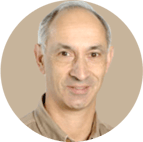
Clinical Academic Lead (Back to Base Days) Melbourne Clinical School, The University of Notre Dame
Honorary Principal Fellow Department of Anatomy & Neuroscience, The University of Melbourne
Associate Professor Norman Eizenberg has taught anatomy to medical students (at Melbourne and Monash Universities) and surgical trainees for more than 40 years. His main areas of research and scholarship are in medical education (including student learning of anatomy) and in anatomical variations (including their surgical implications). He was awarded an Honorary Fellowship Degree (in 2016) by the Royal Australasian College of Surgeons in recognition of “significant work in anatomy and of contributions to the College” and is currently Anatomy Specialty Editor for the ANZ Journal of Surgery.
A/Prof Eizenberg’s biggest role was project leader of the recently completed ANATOMEDIA Online which is a comprehensive, interactive learning platform exploring anatomy from multiple perspectives. So far, ANATOMEDIA has received four national or international awards, including the Australian Publishers Association "Best teaching & learning package in tertiary education" (in 2008).
Meanwhile, he managed to keep his hand in clinical practice after-hours as a GP and received Life Membership “for 30 years extraordinary service as a volunteer doctor at matches” by AJAX Amateur Football Club. He was also fortunate to be a Victorian Australian of the Year Finalist (in 2014) for “outstanding contribution: anatomist, doctor and educationalist”.
Outside interests besides organised sport include nature walks and contemporary music. A/Prof Eizenberg is a bit of a film buff and reads books on biography or history (which like anatomy and unlike him, never become outdated).
.png?width=143&height=143&name=Divyanshu%20Dua%20(1).png)
Dr Divyanshu Dua has worked as a Consultant Medical Oncologist at the Canberra Region Cancer Services since July 2016. He previously worked as a Staff Specialist in Medical Oncology in rural Victoria.
Dr Dua’s experience and training in medicine and oncology spans across three continents including Asia, Europe, and Australia. He specialises in lung cancers, thoracic malignancies, and genitourinary malignancies. He has a special interest in cancer in geriatric patients and a keen interest in medical services development and hospital management.
After doing most of his physician training in Adelaide, Dr Dua went on to do a clinical fellowship at the Guys Hospital in London in drug development, early phase clinical trials, and thoracic malignancies.
In his spare time, Dr Dua is a sports fan and enjoys watching and playing cricket.
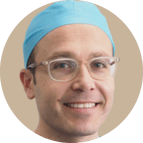
Dr Darren Katz is a urological surgeon who serves as Medical Director of Men’s Health Melbourne. He is a very approachable urologist who understands the importance of providing patients with the highest standards of multi-disciplinary care. His aim is to deliver prompt, ready-access to all forms of urological management – either elective or emergency - and is available 24/7 to GPs and patients.
Dr Katz is the current Leader of the Andrology Special Advisory Group for the Urological Society of Australia and New Zealand. He graduated from Melbourne University Medical School in 2001 and completed his urological training with the Royal Australasian College of Surgeons. He has spent two years at world-leading hospitals - Memorial Sloan-Kettering Cancer Center and Weill-Cornell Medical Centre - in New York completing sub-speciality urological fellowships in andrology, urological prosthetics, male voiding dysfunction, incontinence, and male infertility.
Dr Katz is the director of the only Australian Prosthetic and Micro-surgical Fellowship which trains overseas urologists in world-leading procedures and operations. Dr Katz has trained urologists from USA, Canada, Israel, and England. These urologists spend one year with Dr Katz and his colleagues learning about the latest treatments and operations in his sub-speciality field.
Dr Katz is heavily involved with research and academics and has been awarded both national and international grants and scholarships. He has been an invited faculty member for numerous urological workshops to teach other urologists and training urologists about the latest surgical techniques. He often presents at major international conferences. He is the author of multiple peer-reviewed journal articles and serves as a reviewer for the Journal of Urology, British Journal of Urology International, Andrology, Asian Journal of Urology, Journal of Sexual Medicine, The Asian Journal of Andrology, and the Journal of Andrology and Gynaecology: Current Research. He is involved with several clinical trials and provides the most up-to-date, evidence-based treatments for his patients.
Dr Katz is a member of the Urological Society of Australia and New Zealand, The Fertility Society of Australia, The American Urological Association, The European Association of Urology, and The Sexual Medicine Society of North America.
.png?width=143&height=143&name=Joe%20Kosterich%20(3).png)
Dr Kosterich writes for numerous medical and mainstream publications and is a regular on radio and television. He is often called to give opinions in medico legal cases, is clinical editor of Medical Forum Magazine, adjunct professor (teaching) at UWA and a lecturer at Curtin Medical School.
Medical Advisor to Medicinal Cannabis company Little Green Pharma and Chairman of Australian Tobacco Harm Reduction Association, Dr Kosterich has self-published two books: Dr Joe’s DIY Health and 60 Minutes To Better Health, and maintains a website and blog with health information and commentary.
Previously he held senior positions in the Australian Medical Association and sat on numerous industry and government boards. He has extensive corporate experience in the setting up and management of medical centres and in helping businesses maintain a healthy workforce.
Through all this he continues to see patients as a GP each week.
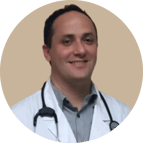
Family & Bariatric Physician - Board Certified
AOBFP & ABOM
Dr Brad Lipson is a family medicine expert in Boca Raton, Florida.
Dr Lipson is an alumnus of Nova Southeastern University in Fort Lauderdale, Florida, with a doctorate in osteopathic medicine (D.O.) after graduating from the University of Miami with a B.S. in psychobiology and minor in business administration. He completed training as chief resident at the family practice residency program at Wellington Regional Medical Center in Wellington, Florida. He received his family practice board certification from the American Osteopathic Board of Family Physicians. He is affiliated with the American Osteopathic Association, American College of Osteopathic Family Practitioners, and the Florida Osteopathic Medical Association.
Dr Lipson was born and raised in South Florida; he is married with two children, speaks Spanish, and enjoys Asian culture, geography, and computer technology. His interests include heart attack and stroke prevention, diabetes (diabetology), cholesterol (lipidology), obesity / metabolic syndrome, high blood pressure, men's health, and sleep disorders. He is a board certified family physician. Fellow of the American Society for Preventative Cardiology.

Dr Michael Lowy is a men’s health physician with a special interest in male sexual dysfunction, relationship counselling and the general health issues of men. Dr Lowy began his medical career in general practice, later becoming a sexual health physician (FAChSHM) and obtained a Master of Psychological Medicine and became a Fellow of the European Committee of Sexual Medicine.
Dr Lowy currently works at The Male Clinic in Woolloomooloo and at Executive Health Solutions at St Vincent’s Clinic. Dr Lowy is a lecturer in Men’s Health at the University of NSW, Notre Dame University, University of Sydney and Family Planning NSW and is a clinical tutor of UNSW medical students. He is a life member of ASSERT NSW and a founding member of Society of Australian Sexologists NSW branch.
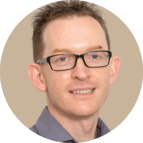

Study at your own pace and to your own schedule. Interactivity, discussion, and feedback opportunities are included.

Easily meet your CPD requirements and gain valuable skills – all in one place.
$1595
*provided an outcome measurement activity with a minimum of 5 hours is completed.
Bundle two courses and save 5%, or three courses and save 10% upon enrolment.
Talk to us about deferred payment options, registrar scholarships and special rates.
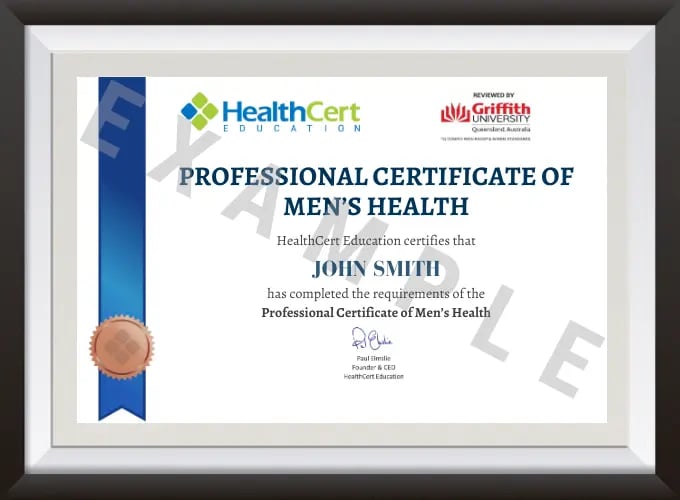
Great course! it is very relevant to all practising GPs. Who knew that there is a pathologist "secret". Every GP should know this!
Dr M. Parashar
Highly satisfied. Real patients and cases enhance the learning experience. I will attend the advanced course.
Dr N. Kazi
Don't miss this course! It's interesting, practical and enjoyable. After attending courses for 30 years, I rank this as number one. The course is very useful to all doctors who diagnose and treat skin lesions. Top marks to the organisers.
Dr P. Laundy
Everything was very relevant and easy to understand. Certainly in a very different league to all the other courses I have attended.
Dr M. Kaur
I wish I had completed this course two years ago. My time in general practice so far has not enhanced my diagnostic or surgical skills and I have been scared about skin checks! I actually feel not only confident but empowered. A fantastic course! Thank you!
Dr A. Mooney

HealthCert courses have become the standard by which you gauge all others.
Dr K. Abolarinwa
Good courses with excellent speakers. I particularly enjoyed the case study scenarios which helped to integrate the knowledge gained.
Dr A. Tucker
This is the pathway to improve your confidence and evolve into the GP you aspire to be.
Dr S. Shinwari
| RACGP Activity Number | ACRRM Activity Number | Activity Title | Education Hours | Performance Hours | Outcome Hours | ||
|---|---|---|---|---|---|---|---|
| 477143 | 31224 | Male anatomy - Clinical problems Part 1 | 477143 | 31224 | 5 | 6 | 0 |
| 477136 | 31222 | Depression in Men | 477136 | 31222 | 3.5 | 6 | 0 |
| 477120 | 31219 | STIs in Men | 477120 | 31219 | 4 | 6 | 0 |
| 477057 | 31217 | Prostate conditions | 477057 | 31217 | 4 | 6 | 0 |
| 477117 | 31218 | Prostate cancer | 477117 | 31218 | 3.5 | 6 | 0 |
| 477128 | 31220 | GP Cases - Lifestyle choices | 477128 | 31220 | 4.5 | 6 | 0 |
| 477133 | 31221 | Male sexual dysfunction | 477133 | 31221 | 4 | 6 | 0 |
| 477138 | 31223 | Fitness - exercise in older men | 477138 | 31223 | 5 | 6 | 0 |
| 802841 | 33008 | Prostate conditions and prostate check Outcome Improvement Activity | 802841 | 33008 | 0 | 0 | 8.5 |
| Total hours | 33.5 | 48 | 8.5 | ||||
View the CPD Hours for all HealthCert Education activities.
The purpose of outcome measurement activities is to improve your clinical confidence in managing an identified learning gap. Outcome measurement activities are not a requirement of our Professional Certificate of Advanced Certificate courses; they are a requirement for Australian CPD purposes.
HealthCert Education provides a variety of outcome measurements activities to suit your needs:
The Professional Certificate of Men's Health is tailored for medical doctors who wish to improve patient outcomes by managing common men's health issues in general practice.
This course is for physicians, nurse practitioners, and degree-qualified nurses. Participants do not have to pass an IELTS test but, as the courses are delivered in English, proficiency in listening, reading and writing English is assumed.
Participants will require access to a computer/laptop, an internet connection and a basic level of technology proficiency to access and navigate the online learning portal.
If you have completed the Foundation Certificate of Men's Health (now defunct), please get in touch with a HealthCert Education Advisor to receive significant savings on course fees + RPL towards the Professional Certificate course.
Further professionally recognised qualifications and prior studies may be recognised for entry into this course if the learning outcomes match exactly. Please ask a HealthCert Education Advisor for an individual assessment of your prior qualifications and experience.
This certificate course meets the minimum 50 hours CPD annual requirement across all three mandatory CPD activity types, provided an outcome measurement activity with a minimum of five hours is completed. You may use an optional HealthCert outcome measurement activity or develop your own.
Outcome measurement activities are not a requirement of Professional or Advanced Certificates.
Upon successful completion of the course requirements, course participants will receive the Professional Certificate
This certificate course:
To learn more about the delivery of certificates in Australia and overseas, please visit our FAQs.
Men's Health Pathway
This course is the first stage of the three-part Men's Health pathway. The full pathway is Professional Certificate of Men's Health, Advanced Certificate of Men's Health, and Professional Diploma of Men's Health.
You might also be interested in HealthCert's Advanced Workshop of Non-Scalpel Vasectomy or the Primary Certificate of Sexual Health for Men.
This organisation is an RACGP-accredited CPD provider under the RACGP CPD Program.



Don't see your question? Explore other faqs or talk to us.
Fees will vary based on the program and study option selected (fully online vs online + optional practical workshop). Payments can be made upfront or in monthly instalments. Special rates and various payment options are available. GP registrars and doctors in training enjoy a scholarship of up to $500. Talk to us to learn more.
Completion of any HealthCert course or attendance at an event will enable you to access the HealthCert Alumni Program which includes:
HealthCert Education is pleased to issue digital credentials for alumni. Digital credentials are a permanent online record of your successful completion of a HealthCert course and are issued to all course participants in addition to PDF certificates. If you are based in Australia, you also have the option to order a hard copy of your digital certificate for a small additional fee.
The recommended study duration of this certificate course is 81.5 hours, which includes study of the pre-course activities and readings, online lectures, live tutorials, and online assessment. This self-paced course offers the flexibility of 100% online study in your own time, at your own pace, in your own home or office, with no mandatory face-to-face requirements. You are not required to be online at specific times but can view and replay video lectures at your convenience.
All HealthCert courses meet World Federation of Medical Education standards. This certificate course qualifies for CPD hours from the Royal Australian College of General Practitioners (RACGP) and the Australian College of Rural and Remote Medicine (ACRRM) in Australia. It is recognised by the Royal New Zealand College of General Practitioners (RNZCGP) in New Zealand. It is recognised by the Hong Kong College of Family Physicians (HKCFP) in China. It is a self-submitted activity in Dubai and the United Kingdom. It is a self-submitted activity through the College of Family Physicians in Canada. If you live or work outside one of the above-mentioned countries, please contact us on admin@healthcert.com to discuss whether this course can be recognised in your country.
Want to stay up-to-date with the latest case studies, podcasts, free video tutorials and medical research articles pertinent to primary care?
Our Education Advisors can assist you with any queries and tailor our education pathway to suit your current expertise, interests and career goals.